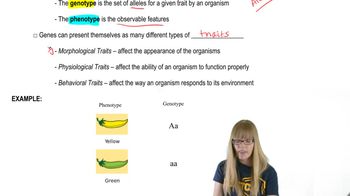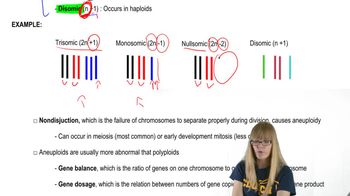Table of contents
- 1. Introduction to Genetics51m
- 2. Mendel's Laws of Inheritance3h 37m
- 3. Extensions to Mendelian Inheritance2h 41m
- 4. Genetic Mapping and Linkage2h 28m
- 5. Genetics of Bacteria and Viruses1h 21m
- 6. Chromosomal Variation1h 48m
- 7. DNA and Chromosome Structure56m
- 8. DNA Replication1h 10m
- 9. Mitosis and Meiosis1h 34m
- 10. Transcription1h 0m
- 11. Translation58m
- 12. Gene Regulation in Prokaryotes1h 19m
- 13. Gene Regulation in Eukaryotes44m
- 14. Genetic Control of Development44m
- 15. Genomes and Genomics1h 50m
- 16. Transposable Elements47m
- 17. Mutation, Repair, and Recombination1h 6m
- 18. Molecular Genetic Tools19m
- 19. Cancer Genetics29m
- 20. Quantitative Genetics1h 26m
- 21. Population Genetics50m
- 22. Evolutionary Genetics29m
6. Chromosomal Variation
Chromosomal Mutations: Aneuploidy
Problem 25
Textbook Question
The woman in Problem 24 has had two miscarriages. She has come to you, an established genetic counselor, with these questions: Is there a genetic explanation of her frequent miscarriages? Should she abandon her attempts to have a child of her own? If not, what is the chance that she could have a normal child? Provide an informed response to her concerns.
 Verified step by step guidance
Verified step by step guidance1
<Step 1: Explain that recurrent miscarriages can sometimes have a genetic basis, such as chromosomal abnormalities in the parents or the embryo.>
<Step 2: Discuss the importance of genetic testing for both the woman and her partner to identify any potential chromosomal abnormalities or genetic disorders.>
<Step 3: Suggest that if a genetic cause is identified, options such as preimplantation genetic diagnosis (PGD) or in vitro fertilization (IVF) with donor gametes could be considered.>
<Step 4: Emphasize that even if a genetic cause is found, it does not necessarily mean she should abandon attempts to have a child, as there are often ways to manage or work around genetic issues.>
<Step 5: Recommend consulting with a genetic counselor or a reproductive endocrinologist to discuss the specific risks and probabilities of having a healthy child, based on the results of any genetic testing.>
Recommended similar problem, with video answer:
 Verified Solution
Verified SolutionThis video solution was recommended by our tutors as helpful for the problem above
Video duration:
1mPlay a video:
Was this helpful?
Key Concepts
Here are the essential concepts you must grasp in order to answer the question correctly.
Genetic Factors in Miscarriage
Genetic factors can significantly contribute to miscarriages, often due to chromosomal abnormalities in the embryo. These abnormalities can arise from either the mother or the father and are a common cause of early pregnancy loss. Understanding the role of genetics helps in assessing the likelihood of future miscarriages and the potential for a healthy pregnancy.
Recommended video:
Guided course

F Factor and Hfr
Recurrent Pregnancy Loss (RPL)
Recurrent pregnancy loss (RPL) is defined as having two or more consecutive miscarriages. It can be influenced by various factors, including genetic, anatomical, hormonal, and immunological issues. Identifying the underlying causes of RPL is crucial for providing appropriate counseling and treatment options for couples trying to conceive.
Recommended video:
Guided course

Mutations and Phenotypes
Genetic Counseling and Risk Assessment
Genetic counseling involves assessing an individual's or couple's risk of genetic disorders and providing information on reproductive options. In the context of recurrent miscarriages, genetic counselors can help evaluate the couple's genetic background, recommend testing for chromosomal abnormalities, and discuss the implications for future pregnancies, including the chances of having a healthy child.
Recommended video:
Guided course

Descriptive Genetics
Related Videos
Related Practice




